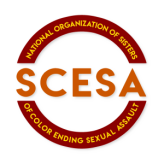Tania Rosario Méndez, MPH – Executive Director: Public Health specialist with over 15 years’ experience leading community organization and mobilization efforts in Loíza and other municipalities in Puerto Rico. She has a strong track record using community theatre and popular education, as means for self-knowledge, healing, and social transformation.
IN HER OWN WORDS
We asked our Sheroes some questions, here’s what Tania had to say:
Why do you think addressing sexual assault is important?
We live in a culture that tolerates it, I would say, it’s a violent culture. In Puerto Rico violence against women is culturally tolerated somehow and violence against children as well. Because it is tolerated it is normalized so there are a lot of microaggressions that can easily lead to sexual assault; people don’t seem to notice that there is a problem, so it is difficult to identify and prevent anything from [happening]. So for us the way we address sexual violence is that we look at it as a part of a bigger understanding of violence. The way that we try to do [our work] is when we speak to young girls and women, for example into the realm of gender violence to bring an understanding that violence should not be tolerated because we face a danger of thinking that it is normal. So we try to work with raising awareness; also with an activism focus to demand more action but then also to work with victims and survivors into healing.
Why is it important for Communities of Color to address sexual assault in their community?
In the case of the community rooted in Puerto Rico, I want to make that distinction, I think that all people in Puerto Rico are people of color; but within Puerto Rico you do have distinctions based on race or perceived race or self-affirmed race. The community we [our agency] are rooted in has faced a long history of social discrimination and exclusion because of race. It’s a community that comes from a history of first being a runaway slave village, but then became a plantation town, so the history of the oppression and violence is centuries old in our community. For us to be able to say to our women that sexual violence is wrong, it is unacceptable, that they know that they don’t have to go through it; I think it’s politically bold that we can do that.
How do you think your work impacts or makes a difference in ending sexual assault?
I think one of the most important agreements that we have is that we work to end violence; to eradicate and end violence and we are very intentional in how we approach that. It’s a multilayered kind of work because we know that in order to end and eradicate something that has become normalized; you have to have a different approach. You work with people and institutions, and then. At the same time, you stay very focused on your intention in order to be able to convey a message in any way possible. [We are] being very careful in the words and pictures we choose, not only in our campaigns but our workshops. We try to develop and work with our participants that invite them to be advocates as well, to participate in ending violence. Also, the work we do is very centered on building power, personal power and building peace in the community.
What are some of the lessons you have learned about addressing sexual assault?
I think that I have learned that you can find allies in unexpected places. We have learned that second opportunities are important and people can change. I think that we have learned that survivors are very brave and resilient people that you don’t need to rescue them from anything. When you dig, you will find out that most people have indignation to be part of your cause.
How do you take care of yourself doing this work?
That’s the hardest part. We have a hard time taking care of ourselves sometimes. I will admit that, especially in the aftermath of the hurricane. We have found that we couldn’t stop to take a break because there were people that were having such dire circumstances that we didn’t have the right to rest. We have had some conversations about how to help each other and also acknowledge that if we don’t take care of ourselves we are not going to be available in the way that our women need us to be. So sometimes, we have to be the boss and order people to rest and not come to work. We had a drastic part of the year and I closed the community center for a week and people weren’t allowed to come into work and it was worth it because people needed to be told not to come to work, to go get rest it was the right thing to do at the time. We have brought professionals to do debriefing and holistic alternatives to our staff as well that I think have been appreciated. We do special self-care activities for staff. We are trying to be more intentional about that because it is hard for us.
